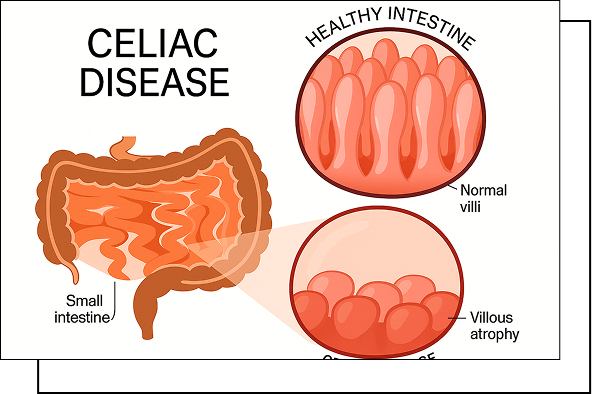Celiac Disease Treatment in Kolkata
Home > Intestinal Diseases > Celiac Disease
Overview
Celiac disease is a chronic autoimmune and digestive disorder where eating gluten triggers an immune response and damages the small intestine. Gluten is a protein found in wheat, barley, and rye. This condition can lead to malnutrition, digestive issues, and long-term complications if untreated.
If you’re looking for a specialised celiac disease treatment doctor in Kolkata, schedule a consultation with Dr. Debjoy Sau. He will guide your journey to better health.

Types of Celiac Disease
Celiac disease can present itself in various forms:
Typical celiac disease
This is the most common form, characterised by classic symptoms like diarrhoea, abdominal pain, and weight loss.
Atypical celiac disease
In this form, symptoms may be less obvious or present in different ways, making diagnosis more challenging.
Silent celiac disease
Individuals with latent celiac disease have no symptoms but may still experience intestinal damage.
Gluten sensitivity
This condition shares some similarities with celiac disease, but it doesn’t involve an autoimmune response and doesn’t cause intestinal damage.
Celiac Disease Symptoms
Your body might signal celiac disease in various ways:
Digestive issues
Lactose intolerance, bloating, diarrhoea, constipation, abdominal pain or cramps, loose, bulky, foul-smelling or greasy stool.
Nutrient deficiencies
Fatigue, anaemia, extreme tiredness, brittle nails, unexpected weight changes, difficulty gaining weight, joint pain and headache.
Skin rash
Known as dermatitis herpetiformis, it’s an itchy, blistering rash linked to gluten consumption.
Symptoms in females
Irregular periods, amenorrhea, anaemia, infertility, and miscarriage.
Symptoms in men
Low energy, reduced bone density, and infertility.
Note: Children may experience delayed growth, while adults might show symptoms like osteoporosis or neurological problems.
Book An Appointment
Causes and Risk Factors
The exact celiac disease etiology is unknown, but it involves genetic and environmental factors, including:
Family history of celiac disease
Stress or infections that can trigger the disease
Down syndrome and Turner syndrome
Pregnancy
Certain genetic markers, such as HLA-DQ2
Early exposure to gluten
Evaluation
Reduce your risk by:
Physical examination
Blood tests
Serological testing
Biopsy
Genetic testing, in some cases
Capsule endoscopy
GI Endoscopy
Antigliadin antibodies (AGAs)

Management
If you or a loved one shows signs of celiac disease, consult Dr. Debjoy Sau, a celiac disease doctor in kolkata. He will help you manage the condition with a personalised care plan. Managing celiac disease means making some changes:
Switching to a strict gluten-free diet
Consulting a celiac disease doctor/dietitian to create your treatment plan
Regular check-ups to track your progress
Taking dietary supplements if needed
Steroids, if required
Avoid processed foods or products, such as canned soup, yoghurt, coffee, salad dressings, sugary items, etc.
Book An Appointment
FAQs
Know Your Answers
Can celiac disease develop suddenly?
Yes, it can appear at any age, often triggered by stress, pregnancy, or infections.
Can celiac disease be cured?
No, there’s no cure for celiac disease, but a strict gluten-free diet effectively manages symptoms and prevents complications.
Will I need to avoid gluten forever?
Yes, a lifelong gluten-free diet is essential for managing celiac disease effectively.
What age group is affected by celiac disease?
It can develop at any age but is often diagnosed in children or young adults.
How quickly will I feel better after going gluten-free?
Most people notice improvements within weeks, though complete healing takes several months.

